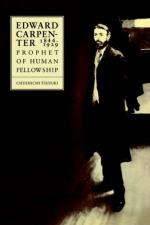|
This section contains 5,589 words (approx. 19 pages at 300 words per page) |

|
SOURCE: "Edward Carpenter, Whitman and the Radical Aesthetic," in Gender Roles and Sexuality in Victorian Literature, edited by Christopher Parker, Scolar Press, 1995, pp. 115-27.
In the following excerpt, Simons delineates the influence of Walt Whitman on Carpenter's thinking.
In 1868 or 1869, Edward Carpenter, Fellow of Trinity Hall, Cambridge (a 'gentlemanly College')1 was reclining in his room. He was an academic success but increasingly bored and dissatisfied by the ease and facility of the privileged life of University and Church into which a man of his talents and background had so easily and naturally slipped. He was made uneasy by the social injustices he saw around him. He was also unaware that an event was about to take place which would not only lead him to reject his positions in the University and the Church but also inspire him to produce a body of writing in both prose and verse...
|
This section contains 5,589 words (approx. 19 pages at 300 words per page) |

|


